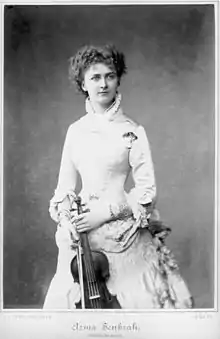Arma Senkrah
Arma Senkrah, (born Anna Loretta Harkness, 6 June 1864 – 3 September 1900) was an American violinist who performed in Europe. Her short career ended in marriage and then suicide.

Early life and education
Anna Loretta Harkness was born in Williamson, New York. At age nine, her mother took her to study violin in Europe. From 1873 to 1875 she studied with Arno Hilf in Leipzig and Henryk Wieniawski in Brussels. She was accepted at age eleven at the Conservatoire de Paris, where she studied with Lambert Massart. She won the conservatory's first prize in 1881 at age 17, receiving a Guadagnini violin inscribed with her name.
Professional life
She embarked on a successful career as a solo violinist at age eighteen. Her Berlin manager Hermann Wolff, believing that he could not market her as "Mary Harkness, from America", had her reverse her name and market herself as the more exotic "Arma Senkrah, from India". She became one of few female violinists to successfully establish her career during the 19th century, performing throughout Europe. Performances included:
- Her professional debut on 25 November 1882, London at Crystal Palace, performing the Vieuxtemps D minor Violin Concerto and Sarasate's Spanish Dance.[1]
- 3 January 1884, Leipzig, at the Gewandhaus.
- 30 September 1884, Berlin Philharmonic Orchestra, performing the Vieuxtemps D minor Concerto.
- 18 December 1885, Frankfurt Museum Concert, performing the Mendelssohn Violin Concerto.

In 1885 she became part of the circle around Franz Liszt in the last year of his life and settled in Weimar. Some historians attribute much of her professional success by capitalizing on Liszt's fame, distributing photos of her and Liszt.[2]
In 1886 she gave concerts in Moscow and met Tchaikovsky. Her performance with the Berlin Philharmonic on 4 October 1886 included his Sérénade mélancolique.
One of her last concerts was in Frankfurt, on 17 February 1888, where she played the G minor Violin Concerto by Max Bruch.
Death and legacy
On 3 September 1900, after twelve years of marriage to a Weimar lawyer by the name of Hoffmann, she shot herself with a revolver, possibly as a result of a brain disorder, or, according to Amy Fay, in despair over her husband's infidelities.[3][4][5]
Fauré, Váša Laub, and Gustav Hollaender all dedicated compositions to Senkrah.[6] A collection of personal photographs and her carte de visite are archived at Brown University.
The 1750 Guadagnini she won at conservatory is now nicknamed after her. It was played by Isaac Stern from 1937-1997.[7] She owned a 1685 Stradivarius that is also now nicknamed after her.[8]
References
- "Crystal Palace". The Musical Times and Singing Class Circular. 23 (478): 661–661. 1882. ISSN 0958-8434.
- Higgins, Paula (1991). "Parisian Nobles, a Scottish Princess, and the Woman's Voice in Late Medieval Song". Early Music History. 10: 195. ISSN 0261-1279.
- "Arma Senkrah". Prone to Violins. July 21, 2013. Retrieved December 22, 2019.
- "American Violinist Kills Herself in Germany". New York Times. September 5, 1900. Retrieved December 22, 2019.
- McCarthy, S. Margaret W. (1985). "Amy Fay: The American Years". American Music. 3 (1): 52–62. doi:10.2307/3052117. ISSN 0734-4392.
- "Category:Senkrah, Arma - IMSLP: Free Sheet Music PDF Download". imslp.org. Retrieved May 23, 2023.
- "Property". Tarisio. Retrieved May 23, 2023.
- "Bogdan Bozovic – Festival Resonances". www.festival-resonances.be. Retrieved May 23, 2023.
Bibliography
Silke Wenzel, "Arma Senkrah," MUGI—Musik und Gender im Internet, accessed 23.12.2022 https://mugi.hfmt-hamburg.de/receive/mugi_person_00000764